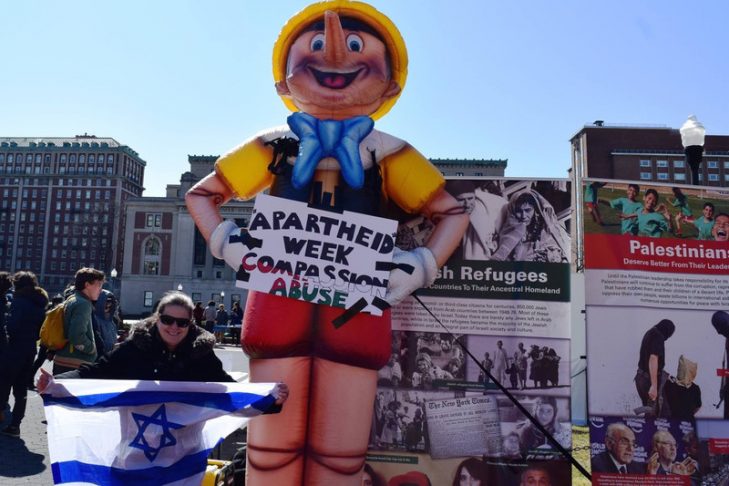“Know your history,” says Aaron Maccabee, a passionate supporter of Israel. As a student at Columbia University, he faces an onslaught of anti-Israel and anti-Semitic programs and professors. This is why he is a member of the Columbia University chapter of Students Supporting Israel (SSI). SSI was created in 2012, and today has over 40 chapters across the country. The organization’s stated goal is “to promote a better understanding of Israel as a member of the family of nations, with a fundamental right to exist as a Jewish, democratic state within secure borders.” Maccabee, a native Minnesotan whose family is from Israel, recently spoke at a private home in Newton.
“SSI is different from most pro-Israel campus groups,” Maccabee explained. “Our group is for all students, not just Jewish students. We have Muslims, Christians and Hindus. We take no political stances; both Republican and Democrats are members. Ours is a new and effective form of activism. We speak with a clear and united voice to inspire others.”
Maccabee showed videos of demonstrations on campus, with protesters holding signs that called Israel an apartheid state, equated the Jewish state with a “Fourth Reich” and called for the murder of Jews. At Columbia, there was a protest against Israel on Holocaust Memorial Day. There were 32 anti-Semitic groups at the school as of 2014. One-hundred twenty-seven professors, 19 percent of the faculty, held anti-Semitic beliefs. The Middle East studies department sponsored 46 anti-Israel events in 2015 and 2016. The departments of anthropology and sociology co-sponsored a “Gaza Great Return March” teach-in. Maccabee also showed anti-Israel and anti-Semitic tweets from professors. Students must understand, he said, “Your professors are teaching this.”
Maccabee explained that anti-Israel groups such as Students for Justice in Palestine join with other groups such as Black Lives Matter to promote their anti-Israel agenda. He pointed out that intersectionality — when groups that see themselves as victims make common cause with other groups who believe they are victims — doesn’t include Jews. “Jews are depicted as puppet masters who control the world, the banks, the media,” said Maccabee, “so Jews are not seen as victims.” He displayed a list of over two dozen student organizations that support this agenda. “One of our problems is that Jews don’t create alliances as these groups do.”
Maccabee noted that pro-Israel groups respond “by talking about all the good things Israel does, like inventing drip irrigation and being the nation that has Gal Gadot, that created cherry tomatoes and has the best hummus.” He explained that this narrative doesn’t work to counter the narratives depicting Israel as aggressive, colonialist and murderous. “Neither does talking about Israel as the Promised Land or evoking the Holocaust.” One of the slides reminded the audience that, “Israel didn’t happen because of the Holocaust. The Holocaust happened because there was no Israel.”
Maccabee affirmed that Jews need to understand and to inform others that “Jews are an indigenous, ethnic Middle Eastern people. We did not come from Europe. Jews in Russia were not considered Russian. Jews in Poland were not considered Polish.” Maccabee briefly reviewed Jewish history, explaining that the First Temple was built in 825 BCE and that the Israelite nation split into the Kingdom of Judea and the Kingdom of Israel after the death of King Solomon in the 9th century BCE. The Second Temple was destroyed in 70 CE by the Romans, who brought 20,000 Jewish slaves to Rome to build the Coliseum. “This was the beginning of the Jewish Diaspora, and we dispersed all over the world,” explained Maccabee. “Jews are from Judea. Arabs are from Arabia. We must be proud of who we are so that we can inspire and empower others.”
Maccabee went on to discuss the unique ways in which SSI at Columbia has responded to anti-Israel attacks. When the annual Israel Apartheid Week was held by anti-Israel groups at the school, SSI set up a giant Pinocchio balloon to call out the lies being spewed against Israel. The Columbia administration had it taken down, which led to a “Free Pinocchio” campaign on social media, which was picked up in the wider media. “Don’t be afraid to stand up,” he asserted. “It’s good to get media attention.” SSI also held a Hebrew Liberation Week, A Celebration of Semitism, focusing on Jews as indigenous to Judea. The group also set up a table on campus backed by a banner which read, “Jews are indigenous to Israel. Change my mind.” This was a challenge that led to meaningful dialogue among students. They also held a panel on “intersectional Zionism” featuring gay, black and other minority Zionists.
“We have to educate students about our story,” said Maccabee, adding, “We are not anti-Palestinian.” Maccabee suggested that advocates for Israel “shouldn’t get caught up in solving the Middle East conflict. Don’t play defense. Don’t fight on their terms by arguing about Israel’s right to exist.” He reiterated the importance of creating alliances, as well as teaching fellow Jews their history, by “publicizing our narrative and the truth of Zionism, which is not a slur as some have used it.”
“Israel is not as it is depicted in the media,” he continued. “Don’t get trapped in what is being told. Stress our connection to the land. We are Am Yisrael, the Nation of Israel. This is our identity as Jews.”
Referring again to Jewish history and myths surrounding an Arab Palestine, Maccabee pointed out that the Romans renamed Judea, calling it Syria Palestina to try to destroy Jewish ties to the land. He added, “The idea of a Palestinian people of Arabic descent was never mentioned until 1964, when the Palestine Liberation Organization was formed.” According to the Jewish Virtual Library, an excellent resource, during the Ottoman Empire’s reign over the area from 1517 to 1917, the name Palestine was used to describe the land south of Syria. After World War I, during the British Mandate, the name Palestine referred to what is now Israel as well as Jordan. Before Israeli independence in 1948, the international press referred to Jews living in the area as Palestinians.
Maccabee pointed out that while Israel is accused of ethnic cleansing, “You can’t have ethnic cleansing of a people that doesn’t exist.” If there was any ethnic cleansing, it was the more than 800,000 Jews driven from Arab and other Muslim countries before and after the establishment of the State of Israel. By 1970, the number reached 900,000.
Maccabee encouraged his audience to, “Take the focus back from the counter movement and become an actual movement.”
Students Supporting Israel includes several high-school programs. The organization is eager to help students start a chapter at their school or college. For more information, visit ssimovement.org. SSI also maintains a blog on The Jerusalem Post website at jpost.com/Blogger/SSI-Blog.
This post has been contributed by a third party. The opinions, facts and any media content are presented solely by the author, and JewishBoston assumes no responsibility for them. Want to add your voice to the conversation? Publish your own post here. MORE



